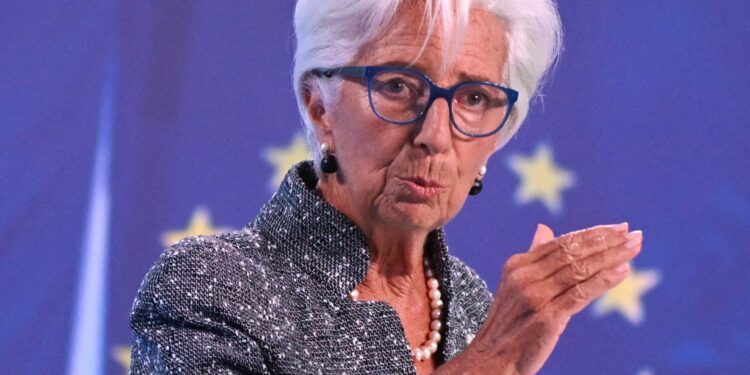European Central Bank President Christine Lagarde said that the repercussions of any global trade war would generally be negative for everyone, and warned that the trade war would not be in the interest of all parties, whether Europe, the United States, or any other party.
Lagarde said, in an interview with the British newspaper the Financial Times, that this war, if it breaks out, would lead to a global decline in gross domestic product.
The European official urged political leaders in the European Union to cooperate with US President-elect Donald Trump on customs tariffs and to purchase more products made in the United States, warning of a fierce trade war that threatens to wipe out global economic growth.
She said the European Union needed to “not retaliate, but negotiate” with the president-elect, who threatened to impose comprehensive tariffs of up to 20% on all non-Chinese American imports.
Referring to Trump’s claims that he can “Make America Great Again,” Lagarde said: “How do you make America great again if global demand is declining?”
Trump’s victory has raised concerns among Europeans who fear that tariffs will erase the EU’s large trade surplus with the United States and stimulate manufacturers in the region to shift production (factories) there.
Checkbook strategy
Lagarde said that Europe should approach Trump’s second term with a “checkbook strategy” in which it offered to “buy certain things from the United States”, such as liquefied natural gas and defense equipment, adding: “This is a better scenario than a pure revenge strategy, which could… It leads to retaliation where no one wins.”
The European Commission, which manages trade policy for the 27 EU member states, is still considering how to respond.
The newspaper noted that Lagarde was frank in expressing her opinion of the US President-elect, as she had previously said that Trump’s second term was a “clear threat” to Europe.
Lagarde stressed that her thinking about how to deal with Trump’s second term “changed a little” over the course of 2024, adding that it is also Europe’s responsibility to exploit the result of the US elections to stimulate much-needed changes in an economy struggling to keep up with its competitors.
Restoring competitiveness
Lagarde agreed with her predecessor Mario Draghi’s diagnosis that the European Union needs to take radical measures to restore its economic competitiveness, after struggling to keep up with the United States over recent decades, and said that Europe is “lagging behind, but I cannot say that it cannot catch up.”
Economists believe that Trump’s threat to impose heavy tariffs on Chinese exports to the United States may prompt manufacturers in Beijing to flood European markets with their products, which poses an additional threat to local competitiveness.
Dumping cheap products would exacerbate tensions between the European Union and China, one of its main trading partners, and put more pressure on a region that has been in economic stagnation since the outbreak of the Corona pandemic.
The ECB President said that policymakers need to carefully monitor such a scenario of “redirecting” Chinese goods (to Europe).
During his campaign, the US President-elect threatened to impose a 60% tariff on all Chinese imports.
Attractive museum
While Lagarde said that it is too early to assess the effects of US tariffs on inflation in the euro zone, she pointed out that in general the impact may be slightly inflationary in the short term, pointing to a possible decline in economic activity and fluctuations in foreign exchange rates.
Lagarde said the incoming Trump administration’s position on transatlantic trade and cooperation was an “accelerator for the reset we need.”
When asked about the view that Europe’s economy has become so outdated and rigid that the continent has turned into a “museum,” Lagarde joked: “It’s a very attractive museum,” noting that there is a lot of innovation across the continent.
She gave an example of the Dutch agricultural sector, saying: “Did you know that the Netherlands is the second largest exporter of agricultural products in the world? Look at the size of the country!” And in the face of common criticism that Dutch tomatoes lack taste, she replied: “But you eat them.”



